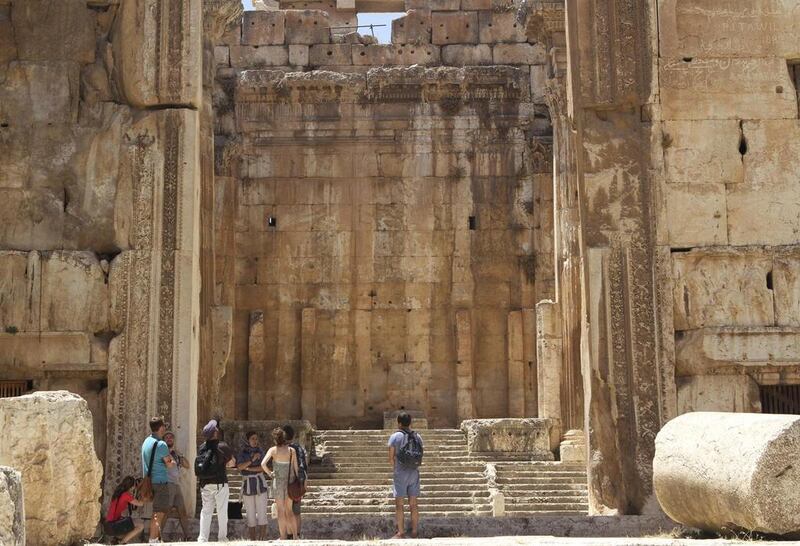Twenty-two years ago, I edited a quarterly magazine for the Lebanese tourism ministry. Visitor, which lasted for six issues wasn’t half bad. We covered everything, with features on all the major cities – I am still very proud of the one we did on the woefully underappreciated Tripoli – and all the major archaeological sites. We also covered local cuisine, rural traditions, winter and summer sports and ran interviews with singers, actors, writers and poets. We tried to give advice on how not to get ripped off buying carpets and even spent a day at the Beirut Hippodrome, should any visiting racing fans fancy dropping by.
Visitor was distributed to all the major hotels and tourist offices but we knew it would only be appreciated by a niche readership. Quite simply, the profile of tourism back then wasn’t that interested in the hammams, khans and caravanserais of Tripoli; the faded delights of Baalbek’s Hotel Palmyra or the poetry of Salah Stetieh. The country’s tourism model was based on a simple formula that offered the Arab visitor a cool respite from the heat of the Gulf. They could unwind, eat, sip tea and smoke shisha, and they felt comfortable among the Lebanese who spoke their language and would bend over backwards to meet their every need. This model became more high powered after 9/11 and the reopening of the Beirut Central District, two events that would for the next decade attract an even more affluent Arab tourist.
So the sun shone and the sector made hay, but this harvest was largely collected in Beirut where tourists came to shop, relax, drink and dine. The outbreak of the Syrian civil war in 2011 changed all that and we haven’t seen any Arab visitors in significant numbers since; there is simply too much Iranian influence in the country and as a result, I would wager that the golden days when Lebanon was the default setting for fun in the sun for the Arabs has gone.
But all this, like a tanker turning in harbour, is slowly changing and the country is selling itself to a new generation of mainly western tourist on a more complex, “warts-and-all” formula, driven by a cuisine-based, love-of-life vibe.
I'm going to stick my neck out and posit that the global food traveller Anthony Bourdain started it back in 2015 with a visit to Lebanon as one of his Parts Unknown series on CNN. At the time, and on these pages, I eviscerated Mr Bourdon's one dimensional and often melodramatic view of the country – his dinner with a Hizbollah member was truly toe curling – but what I will now concede was that he understood Lebanon and was able to convey the complexity and diversity that tends to get under the skin of anyone who visits.
This "Come to Lebanon and taste life" philosophy has found willing converts. Lebanon is regularly listed as one of the world's top gastro destinations, while last year none other than Vogue ran a feature entitled "4 Perfect Days in Beirut". It spoke of "stunning juxtapositions: green hills, a sea-cradled peninsula, labyrinthine streets, neglected architecture – from Arabesque to Venetian Gothic … old mosques, churches and palaces." Travel catnip for anyone with an ounce of curiosity.
And now, heading off on a different, but equally compelling, tangent is GQ, which has just published a mini feature entitled "How to party like it's your last night on earth". It opened by informing American readers that "Beirut is the chosen destination for young rich cool kids across the globe – here's how to pretend you're one of them for 12 hours". Apparently the author only felt unsafe when his Uber driver got lost.
So there is a new category of tourist who wants a few “perfect days” in Lebanon to savour the food, the history and the energy. The private sector is, as usual, leading the way. There are more affordable hotels, restaurants and bars and the focus is now on the authentic, life-affirming experience of the sights, sounds and smells of Lebanon rather than the high-end, but somewhat sterile, offerings of the past.
I sense the Ministry of Tourism is also beginning to catch on to this, so if anyone there is reading this, it might be worth digging out those old Visitor features. It’s all still relevant. We just need to add something about Wi-Fi connectivity and, of course, Uber.
Michael Karam is a freelance writer who lives between Beirut and Brighton
business@thenational.ae
Follow The National's Business section on Twitter





